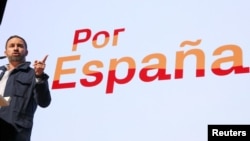Spain's election board blocked on Tuesday the far-right Vox party from participating in the only confirmed debate between leading contenders for the April 28 election.
The ruling shows the complexity of Spain's shift from decades of two-party rule to a fragmented political landscape where no one party looks set to win a majority and Vox has gone from relative obscurity to major force in less than a year.
Vox has never won more than 5 percent of votes in national elections, but achieved a surprise victory in regional elections last year and is predicted by polls to win around 10 percent in this month's parliamentary vote.
That was why Spain's Atresmedia network chose it to join the four major national parties for a scheduled April 23 debate over other movements like Catalan and Basque nationalists.
But the electoral commission said that was a violation of electoral law. Several smaller parties had demanded inclusion in the debate, based on previous electoral performance.
Atresmedia said it would comply - though it did not agree.
"Atresmedia maintains that a debate between five candidates is of the greatest journalistic value and most relevance for voters," the network said in a statement after the ruling.
Vox reacted defiantly, tweeting that separatist parties had swayed the decision. "It's clear who calls the shots still in Spain: the separatists. Until April 28. Because a great victory for #LongLiveSpain will see those parties who wish to destroy our co-existence, constitution and homeland banned."
The vote looks set to be one of Spain's most bitterly-fought in decades. It will probably be split between five parties for the first time since a return to democracy 40 years ago, polls show, making coalition negotiations or even repeat elections a possibility.






